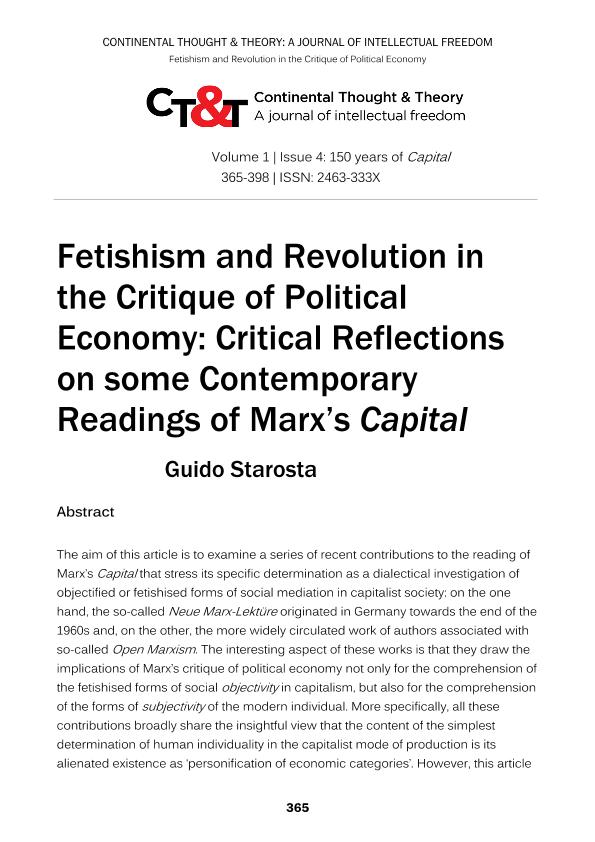Artículo
Fetishism and Revolution in the Critique of Political Economy: Critical Reflections on some Contemporary Readings of Marx’s Capital
Fecha de publicación:
10/2017
Editorial:
University of Canterbury
Revista:
Continental Thought & Theory
ISSN:
2463-333X
Idioma:
Inglés
Tipo de recurso:
Artículo publicado
Clasificación temática:
Resumen
The aim of this article is to examine a series of recent contributions to the reading of Marx’s Capital that stress its specific determination as a dialectical investigation of objectified or fetishised forms of social mediation in capitalist society: on the one hand, the so-called Neue Marx-Lektüre originated in Germany towards the end of the 1960s and, on the other, the more widely circulated work of authors associated with so-called Open Marxism. The interesting aspect of these works is that they draw the implications of Marx’s critique of political economy not only for the comprehension of the fetishised forms of social objectivity in capitalism, but also for the comprehension of the forms of subjectivity of the modern individual. More specifically, all these contributions broadly share the insightful view that the content of the simplest determination of human individuality in the capitalist mode of production is its alienated existence as ‘personification of economic categories’. However, this article argues that the limits of these perspectives become apparent when it comes to uncovering the grounds of the revolutionary form of subjectivity which carries the potentiality to transcend capitalist alienation. For these perspectives fail to ground the revolutionary form of subjectivity in the immanent unfolding of capitalist forms of social mediation. In the case of the Neue Marx-Lektüre, it quite simply leaves the problematique of the revolutionary subject outside the scope of the critique of political economy. In the case of Open Marxism, despite valiant attempts at overcoming all exteriority in their conceptualisation of the relationship between human subjectivity and capital, they end up grounding the revolutionary transformative powers of the working class outside the latter’s alienated existence as personification of economic categories; more specifically, in an abstract humanity lacking in social determinations. In contrast to these perspectives, this paper develops an alternative approach to the Marxian critique of political economy which provides an account of the revolutionary potentialities of the working class as immanent in its full determination as an attribute of the alienated or fetishised movement of the capital-form
Palabras clave:
Capital
,
Fetishism
,
Revolution
,
Dialectics
Archivos asociados
Licencia
Identificadores
Colecciones
Articulos(SEDE CENTRAL)
Articulos de SEDE CENTRAL
Articulos de SEDE CENTRAL
Citación
Starosta, Guido; Fetishism and Revolution in the Critique of Political Economy: Critical Reflections on some Contemporary Readings of Marx’s Capital; University of Canterbury; Continental Thought & Theory; 1; 4; 10-2017; 365-398
Compartir




